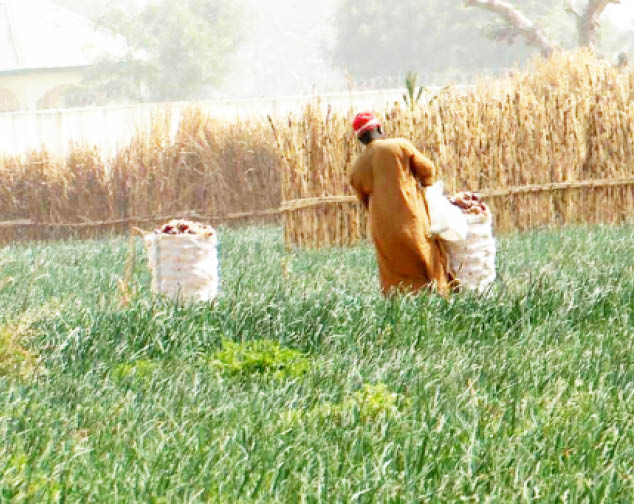Fuel price hike: Vegetable farmers mull quitting
The price of Premium Motor Spirit (PMS), commonly known as fuel, is posing a threat to the sustainability of dry season farming in Plateau State. The recent removal of fuel subsidy by President Bola Tinubu has significantly caused the prices of goods and services in all sectors to skyrocket in the country. Dry season farmers […]

A vegetable farmer
The price of Premium Motor Spirit (PMS), commonly known as fuel, is posing a threat to the sustainability of dry season farming in Plateau State.
The recent removal of fuel subsidy by President Bola Tinubu has significantly caused the prices of goods and services in all sectors to skyrocket in the country.
Dry season farmers in Plateau State are crying, saying the situation is gradually pushing them out of their business.
Prior to fuel price increase, dry season farmers in the state often made substantial investments towards building canals and appurtenances to produce a variety of vegetables. These include tomatoes, carrots, lettuce, cabbage, cucumbers, onions and other vegetable and salad crops meant for the Nigerian market.
Plateau is one of the states in the country that produce vegetables during the dry season, providing income opportunities for hundreds of youths and women. However, farmers said dry season vegetable production was threatened by the recent hike in the price of fuel, which they often relied on during dry season farming.
The farmers said unless government intervened, many farmers were likely to abandon dry season farming in the state.
“This issue of fuel price is severely affecting dry season farming. We are really suffering due to fuel price hike. What we used to spend is completely different from what we are spending now. For example, where we spent N2,000 on fuel is now over N4,000.
“Farmers now cut down the sizes of their farms. Dry season farming is not like before. A farmer who used to cultivate one hectare now cultivates half. Some farmers cannot even cultivate the half because they cannot afford it due to fuel price hike.
“Everything is expensive, including farming inputs, especially fertiliser. This year’s dry season farming is the most difficult because of the change in the price of fuel,” Dauda Sunday, a dry season famer in Barikin Local Government Area of the state said.
Auwal Musa, another farmer who engages in tomato and cabbage farming during dry season in Jos North Local Government Area, also said dry season farming was no longer affordable due to the price of fuel.
He said, “Dry season farming is beyond the capacity of many farmers because of the current price of fuel. Some of us have given out their farms to others who can afford to cultivate them. We are facing lots of problems following the increase in the price of fuel. We never expected this kind of situation. For example, if you want to cultivate a hectare of farmland, you are expected to use a 25 litres of petrol. When you multiply N700 by 25, it is a huge amount of money. When you compare the money you would spend to buy fuel and the price of crops in the market, you hardly make profit, so why should you suffer yourself since the business is not profitable? Farmers have to quit.
“What is more worrisome in the business is that despite all your expenses, there is no guarantee that the product would be sold at a good price. It is a perishable item, so if the market price isn’t favourable, you would either have to sell it at whatever price or lose your investment. The current prices of some crops, such as tomatoes and cabbage, are not favourable.
“Transportation cost has become very expensive. Whoever you hire to transport your crops from the farm to the urban market will charge high due to the price of fuel. In the end, you might return home with nothing as all the expected profits will be consumed by fuel expenses.
“We don’t know if the government would reduce the price in the future, but with the current situation, many farmers would be out of the business.”
Zakari Ya’u, another small-scale farmer in Jos said, “The situation has been affecting them since June when fuel subsidy was removed.
“As a small-scale farmer, before the removal of fuel subsidy, I used to spend N250 on fuel to pump water to my farm, but with the current price, N2,000 worth of fuel will not be sufficient to do the same job.
“A farmer cannot just water the farm two or three times, you have to do that severally, especially when the crop has grown. How can we survive with this situation?
“Dry season farming is a capital intensive business now, so farmers cannot afford it like before. We are really in serious trouble. Only God
